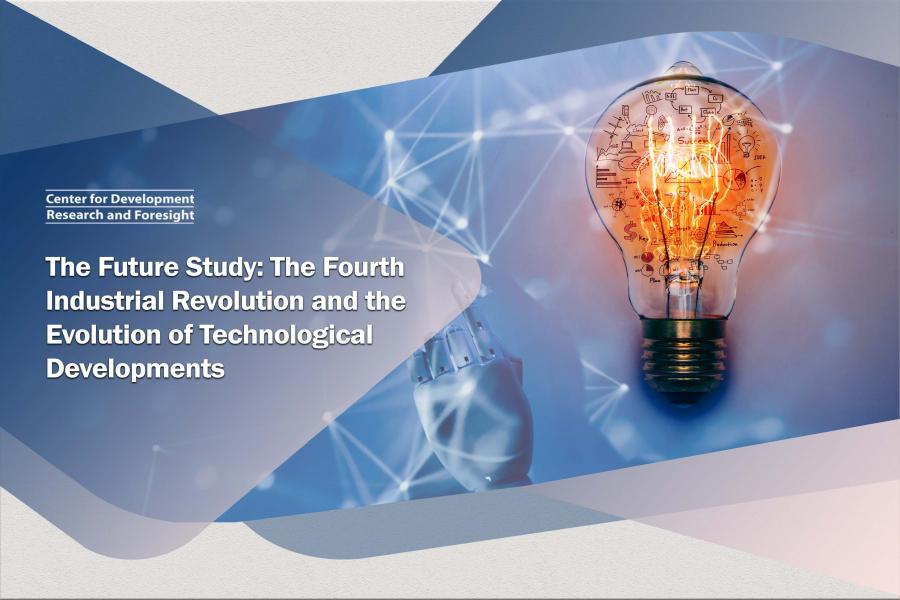
-
بررسی آییننامهها و دستورالعملهای برنامه هفتم پیشرفت
-
بررسی عوامل موثر بر افزایش تصادفات و تلفات جادهای و سوانح رانندگی و دادهکاوی تلفات انسانی
-
سازماندهی و بازآرایی فضایی آموزش عالی کشور
-
به روز رسانی سند ملی آمایش سرزمین
-
انجام مطالعات مناطق آزاد به عنوان نواحی پیشران اقتصادی کشور
-
اصلاح ساختار بودجه و پیاده سازی نظام یکپارچه مدیریت اطلاعات مالی دولت (IFMIS)

This research delves into the concept of the fourth industrial revolution, exploring its dimensions and multifaceted impacts across various domains. It examines the profound influence of technological advancements on the future of transportation, employment, and production while investigating the intricate relationship between technological developments and the water challenge. Additionally, it delves into the impact of technological advancements on agriculture and presents a comprehensive overview of the current state of the country's science, innovation, and technology sector. A thorough analysis of the country's strengths, weaknesses, opportunities, and threats in relation to technological developments is also provided.
The rapid pace, expansive scope, and transformative impact of the fourth industrial revolution mark it not as a mere continuation of the third industrial revolution but rather as the genesis of a new era. This transformative revolution holds the potential to significantly enhance global income and elevate the quality of life for people across the globe.
The integration of novel transportation technologies promises to revolutionize storage efficiency. Projections indicate that by 2050, private car ownership will decline, replaced by the Mobility as a Service (MaaS) concept, boasting an efficiency of over 90%.
Technological advancements exert a profound impact on businesses. When harnessed effectively, these developments can usher in an era of quality work, meaningful employment, and improved living standards for all. However, mismanagement of these advancements can exacerbate skills gaps, widen inequality, and fuel social conflict.
By 2050, artificial intelligence and other emerging technologies, including artificial biology, computational science, nanotechnology, quantum computing, 3D and 4D printers, the Internet of Things, autonomous vehicles, and robotics, are poised to revolutionize the nature of work, the economy, and culture.
Iran's innovation system is an intricate ecosystem comprising a diverse array of infrastructures and resources. Technological and innovative endeavors ultimately culminate in the establishment of knowledge-based enterprises, fostering the development of innovative products and services, generating new employment opportunities, and expanding market frontiers. This ecosystem encompasses economic, environmental, and social consequences that exert a feedback loop on inputs, processes, and outputs. Government components, policies, and laws constitute integral elements of the environmental components.
Given the current trajectory and assuming the continuation of global trends, Iran's research and technology sector must undergo a strategic shift to prioritize addressing fundamental needs and generating wealth through the application of research and technological breakthroughs.
This research presents the IDI index or the information and communication technology development index values for the years 2016 and 2017. The information and communication technology development index is anchored on eleven FAVA criteria categorized into three sub-sections: access, use, and skills.
Among the network readiness indicators, the two indicators of application for business and economic effects hold particular significance for economic operators. Concerning the use index for business, Iran's score in the technology absorption at the company level sub-section stands at 3.7, placing it 132nd among the 139 surveyed countries. In the sub-section of the use of the Internet by business units to communicate with other businesses, the score is 3.9, and the rank is 121. The sub-section of employee training in the field of information technology has secured a score of 3.2 and a rank of 128. These figures suggest that despite the growth of information technology in the country, adequate utilization of information technology remains elusive within economic enterprises. Regarding the economic effects index, Iran's score in the sub-section of the impact of information technology on new organizational models is 3.5, ranking it 108 among the 139 countries surveyed.



